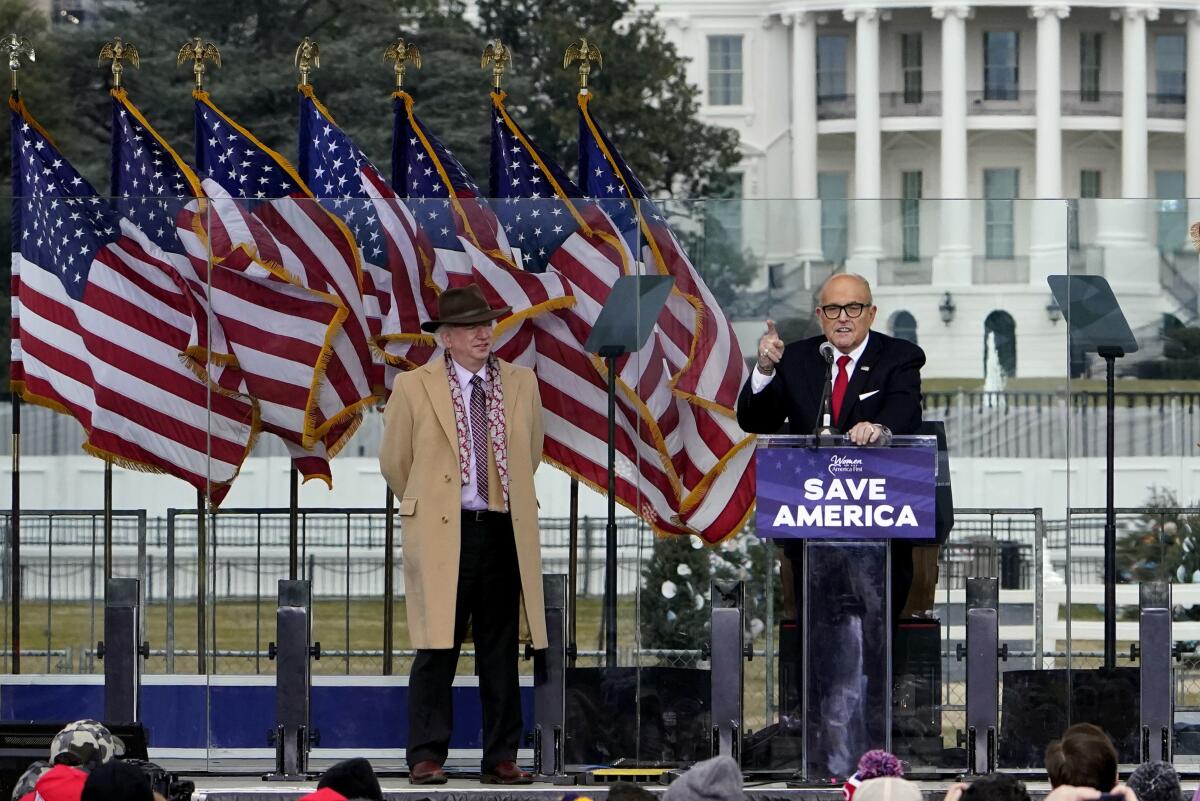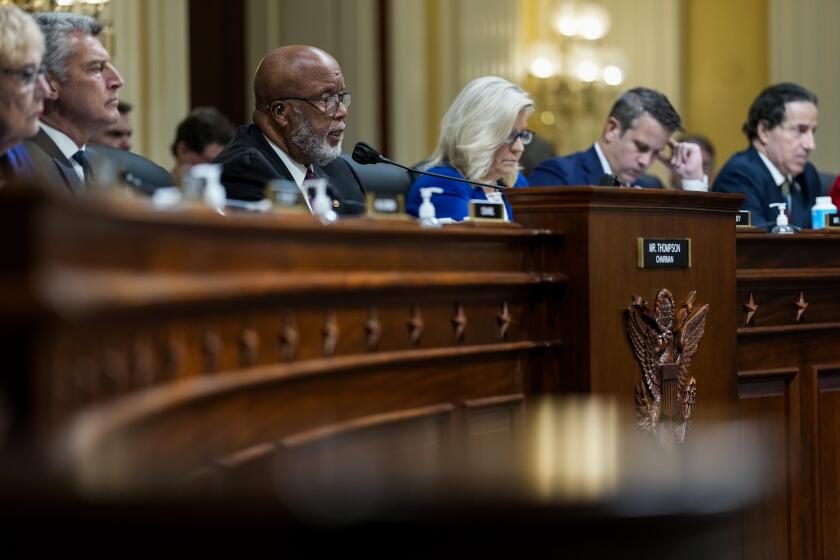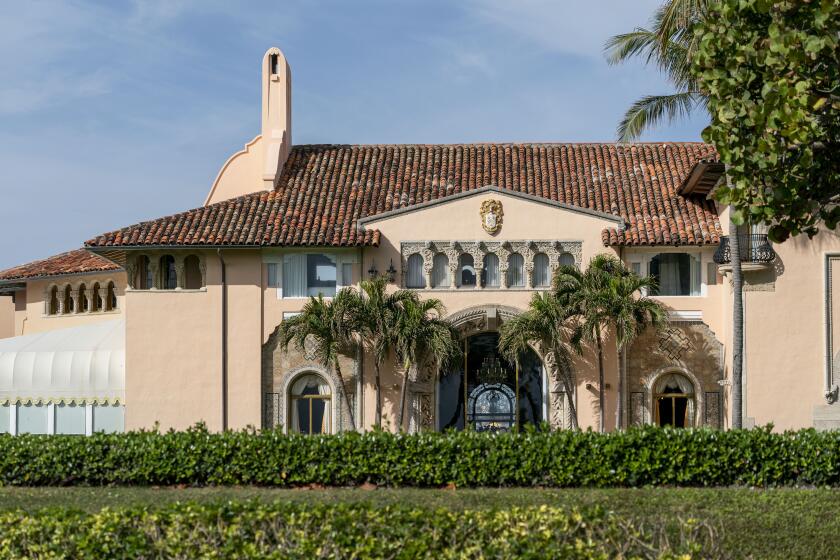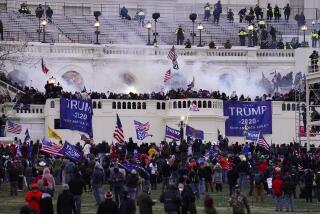Are Jan. 6 investigators hot on the trail of ‘all the president’s people’?

- Share via
The Jan. 6 committee preceded its dramatic Trump subpoena vote last week with a montage of former administration insiders repeatedly invoking the 5th Amendment. It was characteristically clever storytelling, driving home the stark contrast between the holdouts and the many other witnesses — most of them also administration insiders — who recognized their duty, however reluctantly, to provide truthful information to Congress.
We saw a parade of cravenness: Roger Stone, Michael Flynn, John Eastman and Jeffrey Clark provided rote “5th” responses to even the most bland questions, such as Rep. Liz Cheney’s inquiry of Flynn, “Do you believe in the peaceful transfer of power?”
These Trump loyalists, and others, are still helping to protect the former president from a true reckoning for his antidemocratic actions. Many of them may well have committed crimes themselves. The House committee lacked the time and muscle to force them to cooperate. Now the Justice Department should aggressively pursue their testimony and investigate their possible criminal conduct.
From the start, the Jan. 6 investigations in Congress and the Department of Justice have been widely compared to Watergate, and what grew out of it: society’s essential condemnation of the constitutional misconduct of Richard Nixon and “all the president’s men.”
Former President Trump is likely to fight the subpoena in court. With the committee set to disband at year’s end, it has little chance of questioning the ex-president.
Nixon escaped incarceration for his Watergate actions when he was pardoned by President Ford in 1974. The move was enormously controversial and may have resulted in Ford’s 1976 electoral loss to Jimmy Carter. But history has by and large acquitted Ford and endorsed his effort to bring “our long national nightmare” to an end.
However, dozens of other Watergate actors pleaded guilty or were convicted for the burglary of the Democractic National Committee or for its ensuing coverup, for which liability was shared with an “unindicted coconspirator” — Nixon himself.
Those who served time include break-in foot soldiers such as Bernard Barker and Virgilio Gonzalez; political dirty tricksters including Donald Segretti, James McCord and G. Gordon Liddy; and, crucially, Nixon’s senior advisers — H.R. Haldeman, John Ehrlichman, Charles Colson and onetime Atty. Gen. John Mitchell.
The rash of convictions held corrupt officials to account and represented society’s condemnation of wrongdoing at the highest levels of government, notwithstanding the Nixon pardon.
Imagine if those men had not faced retribution, if the response to Watergate had been only forward-looking legislative efforts, such as the intelligence-gathering reforms that emerged from the so-called Church Committee convened in 1975. It might remain an unsettled matter whether the rule of law had effectively re-asserted itself and whether Watergate was “so bad after all.”
Calmes: The Jan. 6 committee did the country proud but it hasn’t changed our calcified politics
If you doubt the contribution made by the Jan. 6 House select committee, just imagine if the panel hadn’t been created.
Glossing over the crimes of Jan. 6 is the risk we face now, particularly as large segments of the country continue to believe that Trump won the 2020 election, or that the House and Justice Department investigations represent a witch hunt, or that the U.S. Capitol marauders were, in the words Trump employed last week, “great American patriots.”
The chance that the attempted insurrection will never be properly punished is only compounded by the distinct possibility, for various legal, political and practical reasons, that Trump himself — however compelling the case against him marshaled by the committee — could escape criminal punishment for his Jan. 6 conduct.
One salutary obstacle to Trump’s prosecution is this: The Justice Department seems likely to bring charges against Trump based on the Mar-A-Lago document scandal, and to do so relatively soon, well before a possible prosecution for his Jan. 6 conduct could be readied. If the former president were to be indicted and possibly convicted because of the Mar-a-Lago case, the national appetite to pursue him further, and the resolve of Atty. Gen. Merrick Garland to do so, would diminish.
The FBI’s search at Trump’s residence constitutes a highly dramatic investigative move against a former president, much more dramatic than anything that occurred during Richard Nixon’s Watergate scandal.
Such considerations do not apply to anyone else who criminally conspired against the peaceful transfer of power that the American people mandated with their votes in 2020.
By my count, more than a dozen people in Trump’s circle deserve serious scrutiny. In addition to Stone — who appears to have been a bridge to the Proud Boys and Oath Keepers — Michael Flynn, would-be DOJ coup orchestrator Clark and phony-electors plotter Eastman, the list includes lawyers Sidney Powell, Jenna Ellis and serial fibber Rudy Giuliani; former Secret Service agent and Trump partisan Anthony Ornato; Trump aide Peter Navarro; schemer in chief Steve Bannon; and assorted hangers-on who spent time in the Jan. 6 “war room” at the Willard Hotel.
Above all, former Trump White House chief of staff Mark Meadows’ actions should be investigated and he should be questioned under oath. Despite being at the center of much of the Jan. 6-related activity, he has remained largely in the background and dodged efforts to force him to testify.
Not all of these actors will turn out to have committed crimes, but most of them surely have important, as yet not fully revealed, information about Trump’s post-election conduct. I can see no reason why they should not promptly be called before the Jan. 6 grand jury convened by the Department of Justice, and if appropriate, quickly charged. Proper action now could have the collateral benefit of leveraging cooperation against higher-up actors including Trump himself.
Whether or not Trump faces federal charges for his Jan. 6 conduct, the aggressive pursuit of all the president’s people, as with Watergate, will be crucial to society’s and history’s assessment of the outrageous offenses against democracy that took place after the 2020 election. The sooner it begins, the better.
More to Read
A cure for the common opinion
Get thought-provoking perspectives with our weekly newsletter.
You may occasionally receive promotional content from the Los Angeles Times.












